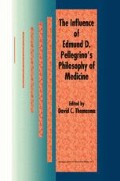Abstract
Family medicine has grown as a specialty from its early days of general practice. It was established as a Board Certified specialty in 1969. This growth and maturation can be traced in the philosophy of family medicine as articulated by Edmund D. Pellegrino, M.D. Long before it was popular to do so, Pellegrino supported the development of family medicine. In this essay I examine the development of Pellegrino’s philosophical thought about family practice, and contrast it to other thinkers like Ian McWhinney, Kerr White, Walter Spitzer, Donald Ransom, and Hebert Vandervoort. The arguments focus on whether the goals of family medicine and family practice (possibly two distinct entities) can be articulated, especially considering the definitional problems of “family” and “community.” I conclude by echoing Pellegrino’s hope that family medicine can contribute a fresh alternative to isolated, individualistic and technological thinking in medicine.
Access this chapter
Tax calculation will be finalised at checkout
Purchases are for personal use only
Preview
Unable to display preview. Download preview PDF.
References
A good summary of these commission reports may be found in Pellegrino ED. Family practice facing the twenty-first century: reflections of an outsider. Marriage Fam Rev 1987; 10 (3–4): 23–50.
Pellegrino ED. Medicine of the family and the family of medicine. Urban Health 1979;8(10): 26 (a).
Pellegrino 1987: 25.
Pellegrino ED. Research in family practice as reflected by The Journal of Family Practice. J Fam Pract 1984; 18: 22.
Pellegrino 1987.
Pellegrino ED. Academic viability of family medicine: a triad of challenges. Conference report: The Role of the Medical School in the Development of the Family Physician (Eldridge, MD: University of Maryland, March 5–6, 1977 ).
Pellegrino ED. An academic base for family practice. Ohio Gen Practitioner 1965; (May): 8.
Primary care includes not only those services that are provided at first contact between the patient and the health professional but also responsibility for promotion and maintenance of health and for complete and continuous care of the individual including referral when required.“ (Ontario Ministry of Health: Report of the Health Planning Task Force, Toronto, 1974, p. 27; quoted in Spitzer WO. The intellectual worthiness of family medicine. Pharos 1977; 40(3): 2–12) See also Starfield B. Primary Care: Concept, Education, and Policy. New York: Oxford University Press, 1992.
Pellegrino 1965.
Pellegrino ED. Expectations for family medicine. J Med Educ 1972; 47: 356–357.
Pellegrino ED. Academic viability of family medicine. JAMA 1978; 240: 133.
Ibid: 132–135.
Pellegrino 1979(a): 27.
Pellegrino ED. Toward a reconstruction of medical morality: the primacy of the act of profession and the fact of illness. J Med Philos 1979; 4: 32–56 (b).
Pellegrino 1979(a).
Pellegrino ED. The family of medicine, broken or extended? The need for moral cement. J Fam Pract 1984; 19: 287–290.
For an example of a detailed effort to relate the humanistic content of family medicine to its scientific and clinical methods, see Levenstein JH, McCracken EC, McWhinney IR, et al. The patient-centered clinical method. 1. a model for the doctor-patient interaction in family medicine. Fam Pract 1986; 3: 24–30. See also Brody H. The Healer’s Power. New Haven: Yale University Press, 1992: 11 65, on why primary care has an ethical basis which is not shared by other specialties.
Pellegrino 1987.
Ibid.
McWhinney IR. A Textbook of Family Medicine. New York: Oxford University Press, 1989: 12–20.
McWhinney: 43–71.
White KL. The general physician: past and future. J Gen Intern Med 1990; 5: 516–521.
Spitzer 1977: 3.
Spitzer 1977: 6–7.
Spitzer 1977: 12.
Ransom DC, Vandervoort HE. The development of family medicine: problematic trends. JAMA 1973; 225: 1099.
Stephens GG. The intellectual basis of family practice. J Fam Pract 1975; 2: 423–428.
For more on this perspective see White KL, Connelly JE, eds. The Medical School’s Mission and the Population’s Health. New York: Springer-Verlag, 1992.
For a good review and an excellent survey of the literature, see Hall MA. Rationing health care at the bedside. N York Univ Law Rev 1994; 69: 693–780.
Pellegrino ED. Rationing health care: the ethics of medical gatekeeping. J Contemp Health Law Pol 1986; 2: 23–45. See also Pellegrino 1987; Pellegrino ED. Balancing head, heart, and hand in the physician’s education: a special task for family practice. J Am Bd Fam Pract 1988; 1: 4–14.
Levinsky NG. The doctor’s master. N Engl J Med 1984; 311: 1573–1575.
Pellegrino 1986.
Pellegrino 1986: 27.
Pellegrino 1986: 24.
Franks P, Clancy CM, Nutting PA. Gatekeeping revisited–protecting patients from overtreatment. N Engl J Med 1992; 327: 424–429.
Clancy CM, Brody H. Managed care: Jekyll or Hyde? JAMA 1995; 273: 338–339.
Pellegrino 1988.
Author information
Authors and Affiliations
Editor information
Editors and Affiliations
Rights and permissions
Copyright information
© 1997 Springer Science+Business Media Dordrecht
About this chapter
Cite this chapter
Brody, H. (1997). Edmund D. Pellegrino’s Philosophy of Family Practice. In: Thomasma, D.C. (eds) The Influence of Edmund D. Pellegrino’s Philosophy of Medicine. Springer, Dordrecht. https://doi.org/10.1007/978-94-017-3364-9_2
Download citation
DOI: https://doi.org/10.1007/978-94-017-3364-9_2
Publisher Name: Springer, Dordrecht
Print ISBN: 978-90-481-4796-0
Online ISBN: 978-94-017-3364-9
eBook Packages: Springer Book Archive

